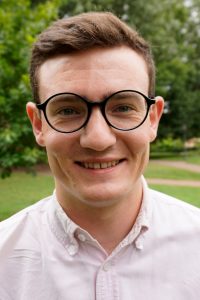
Name: James Hamilton
Specialization: Land Use and Environmental Planning
Graduation Date: May 2023
What got you interested in planning?
I studied public policy as an undergrad, so I’ve always had an interest in solving public problems. Towards the end of my degree, I took a class or two focused on planning and became more familiar with the field. Those classes helped me realize that if I were to ever do a master’s degree, I would want to focus on planning. To me, planning is a tangible way to impact policy. So many of the problems that we face are all very tied to the built environment. My primary interest is in how land is used and how design and connectivity influence how we think, how it influences the interactions and opportunities we have, as well our health and environmental inequities. Approaching these issues from a planning perspective allows us to not only use policymaking skills but also be to be creative within restraints, like working within ordinances or creating incentives with aesthetics.
What drew you to Carolina?
I have ties to North Carolina naturally and, in my research, I found Carolina to be the most consistently excellent program since its inception. It has a long legacy to it that I was very excited to be a part of. The Triangle is also a very interesting laboratory for planning issues since it’s not really a metropolis but is also still quite populous with complex urban and suburban conflicts. There are many local case studies that you can interact with in real time. Studying here exposes you to somewhere that is growing very rapidly and is navigating planning problems for growing cities.
What’s your favorite project that you’ve worked on?
I’ve always enjoyed projects that have been connected to clients. These projects connect you directly to the real world, working in real time with real people. I’m currently working with the town of Pilot Mountain on a revitalization project for DCRP’s “Community Revitalization Techniques” course. In Pilot Mountain there is an older unused building that is a prime storefront on the city’s main street. Our team is working with the town to figure out what the best use of that space would be to attract investment, primarily by providing market and financial analyses. One thing that I’ve enjoyed that I’ve found in this course and others is that Carolina consistently provides opportunities for us to create work products as students and helps us to build up our professional portfolios.
What future goals do you have for your specialization?
In my professional career, I hope to engage with sustainability concepts like energy efficiency, particularly as they relate to infrastructure and transportation. The concept of resilience on a day-to-day scale is very important to me. I’m very interested in being a part of transforming the built environment and improving urban areas to ensure that we consider not only economic development in our cities, but also the promotion of social welfare, active transportation, energy efficiency, and green design. It is important to me to consider how everything is connected to the thing next to it, that we have a coherent understanding of an area and can see how each of its elements act as part of a system, rather that viewing developments as individual plots of land.
When I think about my future planning career, I think about how I’d like to work within the intersection of things as much as possible. Planning as a field isn’t naturally siloed into different industries and I would love to see my career reflect planning’s intersections in the public, private, and academic sector.